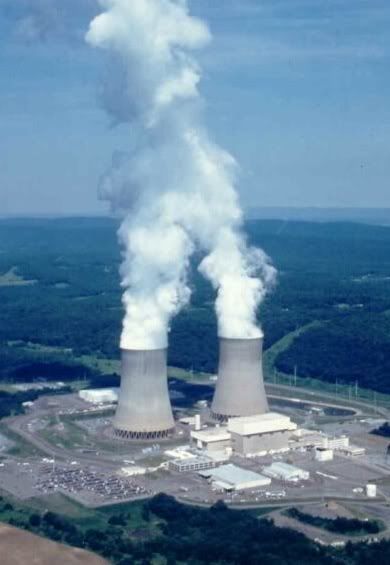Problems mount for Southern nukes
 The nuclear industry's hoped-for renaissance is facing big problems in the South.
The nuclear industry's hoped-for renaissance is facing big problems in the South.
For one thing, the historic drought that's been afflicting the region since early last year could force even existing reactors to cut back production or temporarily shut down due to the drying up of rivers and lakes that provide the plants with the enormous amounts of cooling water they need to operate, according to an Associated Press investigation:
An [AP] analysis of the nation's 104 nuclear reactors found that 24 are in areas experiencing the most severe levels of drought. All but two are built on the shores of lakes and rivers and rely on submerged intake pipes to draw billions of gallons of water for use in cooling and condensing steam after it has turned the plants' turbines.
Because of the yearlong dry spell gripping the region, the water levels on those lakes and rivers are getting close to the minimums set by the Nuclear Regulatory Commission. Over the next several months, the water could drop below the intake pipes altogether. Or the shallow water could become too hot under the sun to use as coolant.
The drought has already been causing problems for Southern nukes. In August, the Tennessee Valley Authority was forced to shut down one reactor at the Browns Ferry nuclear plant in Alabama and scale back production at the plant's two other reactors because of overheated water in the Tennessee River, which is used to cool the facility.
This past fall, officials with North Carolina-based Progress Energy warned that the drought could force it to shut down the Shearon Harris nuclear plant near Raleigh due to low levels in adjacent Harris Lake, the AP reports. And water levels at Lake Norman next to Duke Energy's McGuire nuclear plant near Charlotte, N.C. are less than a foot above the minimum set in its license.
For every three units of energy produced by a nuclear power plant, two units are discharged to the environment as waste heat, according to a recent issue brief by the Union of Concerned Scientists (UCS). As the AP reports, this translates into an enormous demand for cooling water. For example, Progress Energy's Harris reactor takes in 33 million gallons of water a day, with 17 million gallons of that lost to evaporation.
And the water shortage is not the only problem for the region's nukes. Security is another serious concern.
The U.S. Nuclear Regulatory Commission this week proposed a $208,000 fine against Florida Power & Light for security violations at its Turkey Point nuclear plant 35 miles south of Miami. The fine is for four violations -- two incidents in which armed security officers willfully disabled weapons by removing or breaking firing pins, a failure to make a 1-hour report to the NRC as required, and providing the NRC with incomplete and inaccurate information.
Security for Turkey Point is provided under contract with Miami-based Wackenhut, which has been under fire for an incident in which its guards were caught on videotape sleeping at Exelon's Peach Bottom nuclear power plant in Pennsylvania. As a result, Exelon terminated Wackenhut's security contracts at its 10 nuclear plants last month, replacing them with an in-house security force.
Wackenhut is not the only security company under fire for problematic performance at nuclear power plants. My own investigation into conditions for officers employed by Securitas to guard Progress Energy's Harris plant uncovered numerous problems with plant security, including malfunctioning protective equipment and widespread cheating on qualification exams, which guards say was encouraged to keep Securitas from losing trained employees to high turnover. Last year the NRC fined Progress $65,000 for the violations, a relatively small amount for a company with more than $9 billion in annual revenue.
Jim Warren, executive director of the Durham-based N.C. Waste Awareness and Reduction Network -- one of the groups that originally brought the Harris security problems to the attention of regulators and the press -- says that the bigger fine against FP&L seems to suggest that NRC is getting tougher on security infractions. But, Warren adds, "U.S. nuclear plants remain lightly defended relative to the level of a variety of plausible attacks that could cause catastrophic radiation releases."
A UCS report released last month on risks to nukes in a warming world found that federal security standards are inadequate to defend plants against all-too-real terrorist threats. For example, nuclear power plants are not currently required to defend against air attacks, attacks using readily available rocket-propelled grenades, or an attack by more than about five terrorists at once (the exact number is classified). The report recommended that the Department of Homeland Security -- not the industry-friendly NRC -- identify threats to nuclear power plants.
Tags
Sue Sturgis
Sue is the former editorial director of Facing South and the Institute for Southern Studies.
